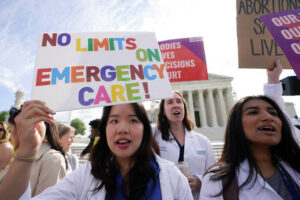China trade, export control talks push through second full day in London
LONDON — Trade talks between the U.S. and China in London are going well and could spill into a third day, U.S. negotiators said, as the two superpowers pushed for a breakthrough on duelling export controls that had threatened to unravel a delicate tariff truce.
U.S. Treasury Secretary Scott Bessent told reporters he would return to Washington for a prior commitment but U.S. Commerce Secretary Howard Lutnick and Trade Representative Jamieson Greer would continue the talks as needed.
ADVERTISING
Lutnick told reporters earlier Tuesday that the talks could run into Wednesday.
“I think the talks are going really, really well. We’re very much spending time and effort and energy — everybody’s got their head down working closely,” he told reporters at Lancaster House, where the two teams have met for two days.
“I hope they end this evening, but if they need be, we’ll be here tomorrow,” he said as the U.S. delegation arrived for evening talks with Chinese officials.
Bessent said the talks had been productive and were ongoing.
Negotiators had paused for a break earlier before reconvening at about 8 p.m. local time. No details were immediately available from the meetings, which stretched for more than five hours following a full day on Monday.
A White House official also said the U.S.-China trade talks were going “fine,” but declined to provide details.
Having agreed to step back from a full-blown trade embargo at a first round of talks in Geneva in May, the two sides are now seeking agreement after they accused each other of trying to throttle supply chains with a raft of export controls.
White House economic adviser Kevin Hassett said on Monday that the U.S. could lift recently imposed export controls on goods such as semiconductors if China sped up the delivery of rare earths and magnets that are crucial to its economy.
The blow-up over rare earths, which has sparked alarm in boardrooms and factory floors around the world, came after last month’s preliminary deal in Geneva to cut tariffs, which eased investor fears that a trade war would lead to a global slowdown.
William Reinsch, a trade expert with the Center for Strategic and International Studies, said the meeting’s length may indicate difficulty in the negotiations.
“My read is Trump is very anxious his team comes back with something he can brag about, and it looks like the Chinese are holding out, said Reinsch, a former U.S. official. “That said, I expect there to be some kind of agreement eventually, and you can be sure he’ll call it a big success, regardless of what’s in it.”
Josh Lipsky, chair of international economics at the Atlantic Council, said the extended nature of the talks this week could point to more detailed discussions. “My sense of that is that they’re getting granular at this point, which should be seen as a positive,” he said, although he cautioned against expecting a major breakthrough this week.
U.S. President Donald Trump’s shifting tariff policies have roiled global markets, sparked congestion and confusion in major ports, and cost companies tens of billions of dollars in lost sales and higher costs. The World Bank on Tuesday slashed its global growth forecast for 2025 by four-tenths of a percentage point to 2.3%, saying higher tariffs and heightened uncertainty posed a “significant headwind” for nearly all economies.
But markets have made up much of the losses they endured after Trump unveiled his sweeping “Liberation Day” tariffs in April, aided by the reset in Geneva between the world’s two biggest economies.
The second round of U.S.-China talks, which followed a rare phone call between Trump and Chinese President Xi Jinping last week, comes at a crucial time for both economies.




